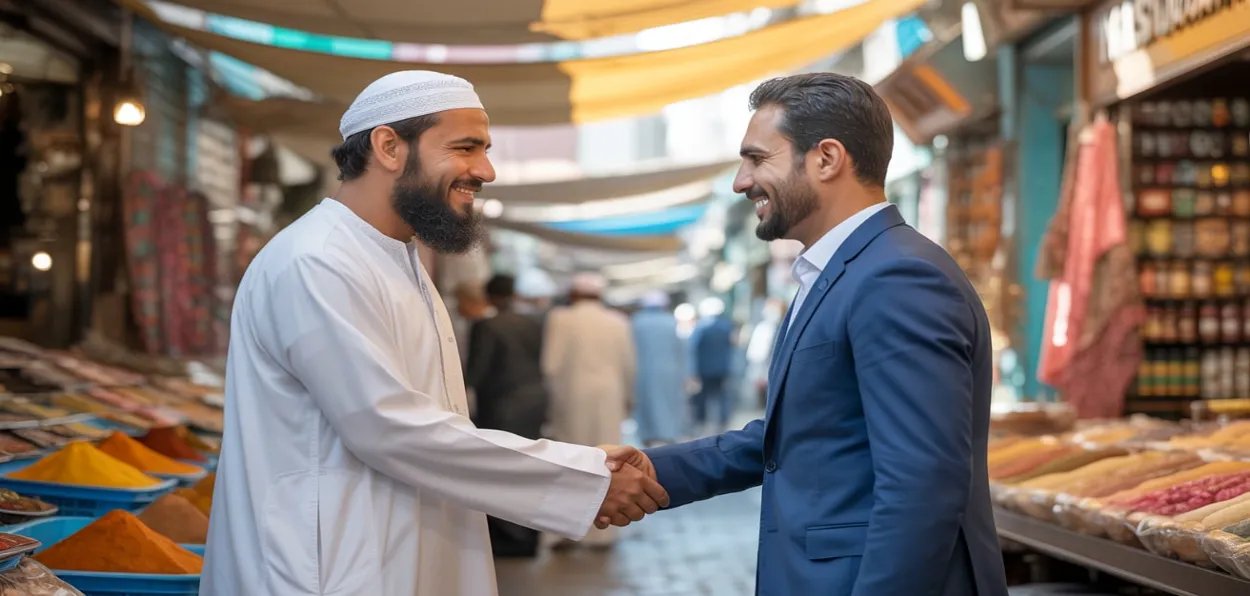
Eman Sakina
Islam is a comprehensive way of life that guides human beings not only in matters of worship but also in their dealings with one another. Social interaction is an essential part of human existence, and Islam lays down clear principles and etiquette to ensure that relationships are built on respect, kindness, and justice. These guidelines, rooted in the Qur’an and the Sunnah of the Prophet Muhammad, help in maintaining peace and harmony in society.
Friday Musings
Greetings with Peace
One of the most beautiful etiquettes taught by Islam is to greet others with the words of peace: “As-Salamu Alaikum” (peace be upon you). This greeting is not merely a formality but a heartfelt prayer for peace, safety, and blessing for the other person. The Qur’an instructs believers: “And when you are greeted with a greeting, then greet with one better than it, or return it (in a like manner). Surely Allah is Ever, an Accountant over all things.” (Surah An-Nisa 4:86)
The Prophet Muhammad encouraged Muslims to spread the greeting of peace widely, even to those they do not know, as it fosters love, removes distance, and strengthens the bonds of brotherhood.
The Art of Speech
Islam gives great importance to the use of the tongue. Words can heal or hurt, unite or divide. The Prophet (peace be upon him) said: “Whoever believes in Allah and the Last Day should speak good or remain silent.” (Sahih al-Bukhari, Sahih Muslim)
Muslims are encouraged to use polite, kind, and truthful words. Harshness, ridicule, gossip, backbiting, and slander are strictly forbidden. The Qur’an warns against backbiting, likening it to eating the flesh of one’s dead brother (Surah Al-Hujurat 49:12). Similarly, listening attentively when others speak is also part of good manners, as it shows respect and humility.
Visiting and Hospitality
Visiting family, friends, and neighbours is a highly recommended act in Islam, but it must be done with respect and consideration. Seeking permission before entering someone’s house is obligatory, as the Qur’an commands:
“O you who believe! Do not enter houses other than your own until you have asked permission and greeted their inhabitants.” (Surah An-Nur 24:27)
Hospitality is a noble trait deeply emphasized in Islam. The Prophet (peace be upon him) said: “Whoever believes in Allah and the Last Day should honour his guest.” (Sahih al-Bukhari, Sahih Muslim). Offering food, drink, and a kind attitude to guests is a form of worship and a way to earn Allah’s pleasure.
Modesty and Humility in Interaction
Modesty is a cornerstone of Islamic character. It applies to speech, dress, and behaviour. Islam prohibits arrogance, pride, and showing superiority over others. The Prophet (peace be upon him) said: “No one who has an atom’s weight of arrogance in his heart will enter Paradise.” (Sahih Muslim)
When interacting, men and women are advised to maintain dignity, avoid inappropriate behaviour, and respect boundaries. True honour in Islam lies not in wealth or status, but in humility, righteousness, and good character.
Respecting Neighbours and Community
Islam strongly emphasizes the rights of neighbours. The Prophet Muhammad (peace be upon him) said: “Jibreel kept advising me concerning the neighbour until I thought he would make him an heir.” (Sahih al-Bukhari, Sahih Muslim).
A Muslim should never harm his neighbour, whether by word or action, and should be considerate in all dealings. This teaching extends beyond Muslims; kindness and respect are due to neighbours of all faiths, as it reflects the universal mercy of Islam.
Forgiveness and Patience
Disagreements and conflicts are part of human life, but Islam teaches believers to rise above anger and embrace forgiveness. Allah praises those “who restrain anger and pardon people” (Surah Aal-e-Imran 3:134).
The Prophet described true strength as the ability to control one’s anger rather than overpower others in combat. Forgiveness creates a peaceful environment and strengthens relationships, making it one of the most valued social etiquettes.
Maintaining Ties of Kinship
Another important aspect of Islamic social etiquette is maintaining ties with relatives. Severing family relations is considered a major sin. The Prophet (peace be upon him) said: “The one who severs the ties of kinship will not enter Paradise.” (Sahih Muslim).
Visiting, supporting, and caring for relatives—even if they fall short in their duties—demonstrates sincerity and obedience to Allah’s command. This etiquette strengthens the foundation of society by nurturing family bonds.
Helping and Supporting Others
Islam encourages cooperation, mutual help, and compassion. The Qur’an says: “Help one another in righteousness and piety, and do not help one another in sin and transgression.” (Surah Al-Maidah 5:2)
Being there for others in times of need, sharing resources, offering guidance, and giving charity are all ways of fulfilling social responsibility. These actions not only benefit individuals but also uplift the entire community.
ALSO READ: German Gerda Phillipborn was the first woman to work in JMI
Etiquette is more than cultural practice; It is a set of divine guidelines meant to shape a society of respect, kindness, and justice. In essence, Islamic manners are a reflection of faith, a means of drawing closer to Allah, and a path toward building a society that thrives on compassion and mutual respect.
